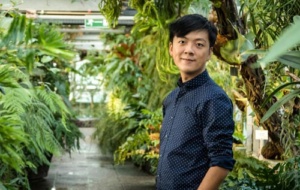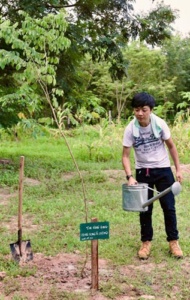A forest scientist from a concrete jungle
 Dr Tin Hang (Henry) Hung 洪天恒 (2017, DPhil Plant Sciences), Radcliffe Scholar
Dr Tin Hang (Henry) Hung 洪天恒 (2017, DPhil Plant Sciences), Radcliffe Scholar
I come from Hong Kong. If you haven’t been to Hong Kong, you would probably think of a concrete jungle with little nature. It wouldn’t surprise me if you thought of it that way, because, to quote, “wild, dreary, bleak, and apparently barren… large bare masses of rocks unscreened by foliage… trees can scarcely be said to exist” were the words spoken by Richard Brinsley Hinds, the naturalist of HMS Sulphur when he visited Hong Kong in 1841. That was my impression of Hong Kong too – at least until university years, when I learned that Hong Kong is thought to be named after the fragrance tree (Heung tree). Hong Kong, Heung Gong, port of fragrance. It was historically ubiquitous and made Hong Kong popular even in the Arabic world, but now they are at the brink of extinction because of illegal poaching. I couldn’t help but ponder, if one day these trees disappeared completely, what would Hong Kong even mean?
I realised the intimacy between our humanity and nature, and extended that empathy towards the world’s most trafficked wild species – rosewoods, as I pursued my doctorate at Univ. The world’s illegal wildlife trade is valued at up to 20 billion US dollars per year and rosewoods alone account for more than its 30% (more than all animal products added together). I particularly studied rosewoods in Southeast Asia, which still experienced extreme poverty in some regions – where household annual income was less than USD 2,000. On the other hand, rosewoods were valued up to USD 100,000 per cubic metre in China. When I visited Cambodia in 2018, I asked one of the government officials why they don’t have more severe punishments to stop the poaching. They answered, “It’s useless. No matter how severe the punishment is, they will still do that for the money to feed their family, they’d rather go to jail”. Poachers would even kill the forest rangers with guns rosewood becomes “bloodwood”.
The Alliance of Bioversity International and CIAT, my collaborator, saw an optimistic way out. They wanted to empower the local people by engaging them in collecting seeds and growing them to sell, thus establishing a sustainable supply chain of seedlings for restoration, but at the same time generating income to alleviate their poverty.
 But we needed a plan. Simply planting more trees wouldn’t be enough because climate change is muddling how trees adapt to the future environment. I incorporated climate models and genomic data to achieve a three-objective holistic plan: first, I could map out the diversity of these trees across their range; second, I predicted regions with higher vulnerability so that they should be prioritised; third, I developed an online app to find suitable seed sources to match a future restoration site because of the shift in climate. This was not an easy job as we collected more than 800 samples of rosewood leaves, and I spent months extracting and sequencing their DNA before an even more tedious journey of computer analysis.
But we needed a plan. Simply planting more trees wouldn’t be enough because climate change is muddling how trees adapt to the future environment. I incorporated climate models and genomic data to achieve a three-objective holistic plan: first, I could map out the diversity of these trees across their range; second, I predicted regions with higher vulnerability so that they should be prioritised; third, I developed an online app to find suitable seed sources to match a future restoration site because of the shift in climate. This was not an easy job as we collected more than 800 samples of rosewood leaves, and I spent months extracting and sequencing their DNA before an even more tedious journey of computer analysis.
The collaboration bore fruit. In just three years, our collaboration established 23 new conservation units in these countries and trained more than 300 local people for forestry practices. In Cambodia, we supported communities to double their income from selling rosewood seedlings.
For one of its largest nurseries, we saw over double the seedling production of 90,000 seedlings annually. But our efforts did not end here – I was named a National Geographic Explorer in 2022 to continue my research into how rosewood trees face the challenge of extreme droughts, which are increasingly frequent and severe in Southeast Asia.
I submitted my thesis and graduated from Univ in 2022, but I never imagined that it would lead to “one of the most prestigious prizes in natural history” recognised by The Linnean Society. I was simply grateful for the motivation I got from my collaborators, my mentors John MacKay and David Boshier, and people living in the Mekong. They inspired my research with their passion for the forests.
We are in a race for new technologies, medical treatments, and sustainable solutions to bring hope to this world. I am committed to being a forest scientist for many years to come.
– –
Dr Hung was named a National Geographic Explorer in 2022 and awarded the Irene Manton Prize by The Linnean Society in 2024 for his work on critically endangered rosewoods while he was at Univ as a Radcliffe Scholar.
This article was first published in the 2024 issue of The Martlet.
Published: 15 November 2024
